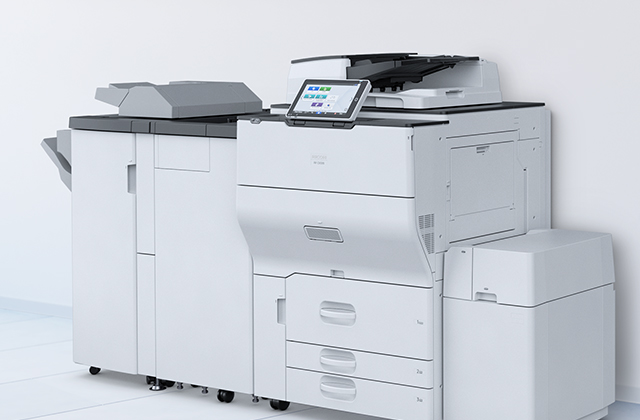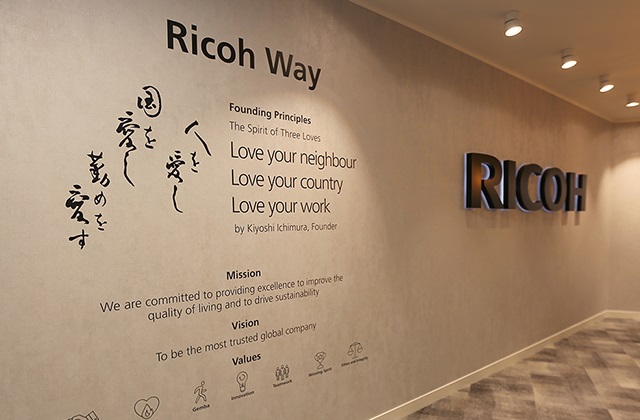SMEs: Starting small, going global
By Javier-Diez-Aguirre, Vice President, Corporate Marketing, Ricoh Europe
Ricoh Europe, 10 March 2016 - The chances are your neighbourhood family-run grocery store will not be expanding into international markets anytime soon. Similarly your local bakery, butchers and pharmacy probably don’t harbour dreams of overseas expansion. But what about the independent accountancy firm, construction group or logistics specialist? For those businesses, globalisation could well be the ultimate goal – and recent research commissioned by Ricoh reveals that this is indeed high on the agenda for SMEs in EMEA; 74 per cent of small and 86 per cent of medium sized businesses said they plan to expand into another country over the next five years . SMEs know that their fastest route to growth is through exposure to new markets and more customers – and globalisation is a key component in this process.
Easy access to sophisticated communication and collaboration technologies has meant that international expansion, and the ability to target and connect with customers in new markets, is rapidly becoming a more viable growth option. The Cambridge Satchel Company , launched in 2008 in the UK, is a great example of a small business that took full advantage of the international, digital marketplace, and now sells to customers in more than 100 countries while having only four physical stores.
Of course, new markets aren’t without competition and complexity – there will always be barriers to overcome – so SMEs should welcome the EU’s plan to create a Digital Single Market by the end of 2016, which intends to remove some of the obstacles to international expansion. When you consider that the Digital Single Market is forecast to contribute €415 billion to the EU economy each year, SMEs expanding to access a wider pool of consumers and business spending becomes even more appealing. With countries across Europe debating the future scope and shape of their relationships with the European Union, SMEs must be prepared to give their expansion plans the best chance of success.
But how exactly might SMEs benefit from a fully functional Digital Single Market? Most importantly it would ensure that they are not hindered by unjustified geo-blocking – the process of limiting customers from specific physical locations from accessing a digital service. Dismantling this inhibition will encourage SMEs to sell their full range of products online at a consistent price, to a broader, international audience.
In addition, the Digital Single Market will assist international expansion with the establishment of centralised online platforms that facilitate market entry. These form a crucial part of the digital ecosystem and help structure online activity by acting as intermediaries between consumers and businesses, offering universal access to important information and content. This helps SMEs – who often face difficulties in making themselves visible online – to become genuine digital players.
Beyond support from the EU, to succeed in foreign markets, companies must be able to communicate and share information easily. This means streamlining processes and adopting new technologies in order to encourage the kind of cross-border collaboration and integration that globalisation necessitates.
There’s no denying that expanding a business to foreign markets is challenging – especially as an SME – it often feels like you need a PhD in global tax laws. Fortunately, there are a number of advisory companies that can offer their expertise in supporting the globalisation process.
The bottom line is that despite its challenges, international expansion can yield huge growth for SMEs – potentially catapulting them from being successful local players to global household names.
1. http://www.bbc.co.uk/news/business-32807137
2. http://ec.europa.eu/priorities/publications/factsheets-digital-single-market_en
| About Ricoh |
Ricoh is empowering digital workplaces using innovative technologies and services that enable individuals to work smarter from anywhere.
With cultivated knowledge and organizational capabilities nurtured over its 85-year history, Ricoh is a leading provider of digital services, information management, and print and imaging solutions designed to support digital transformation and optimize business performance.
Headquartered in Tokyo, Ricoh Group has major operations throughout the world and its products and services now reach customers in approximately 200 countries and regions. In the financial year ended March 2022, Ricoh Group had worldwide sales of 1,758 billion yen (approx. 14.5 billion USD).
For further information, please visit www.ricoh-europe.com
© 2023 RICOH COMPANY, LTD. All rights reserved. All referenced product names are the trademarks of their respective companies.
For further information, please contact:
Ricoh Europe PLC
Charlotte Fernandez
E-mail: media@ricoh-europe.com
Homepage: www.ricoh-europe.com
Join us on Facebook: www.facebook.com/ricoheurope
Follow us on Twitter: www.twitter.com/ricoheurope
Follow us on LinkedIn: http://linkedin.com/company/ricoh-europe
Visit the Ricoh media centre at: www.ricoh-europe.com/press














